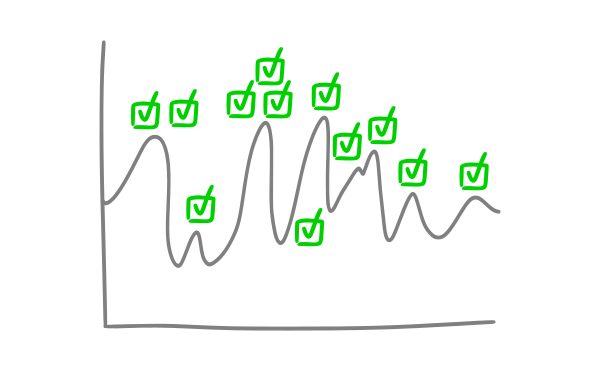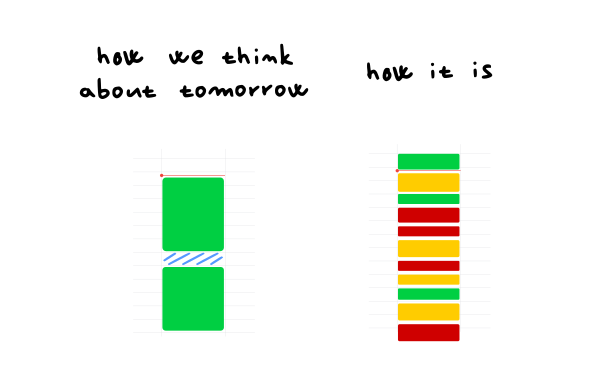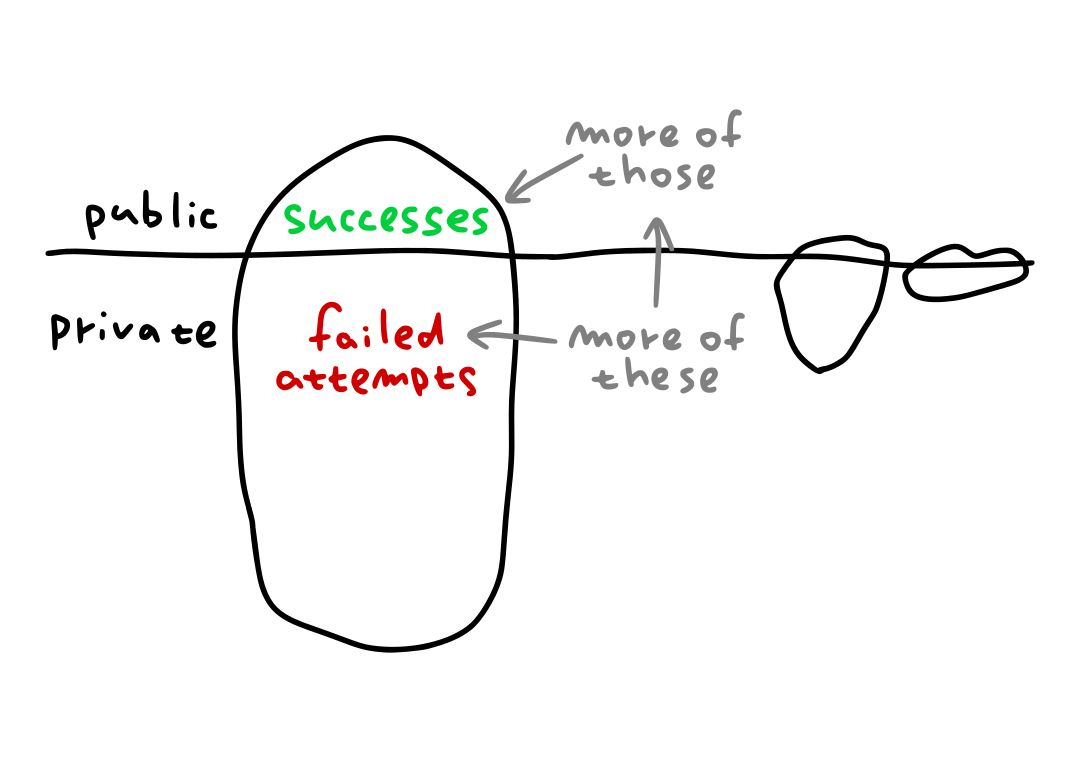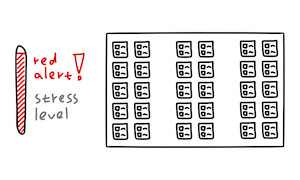Stop postponing things by embracing the mess

Does your day get derailed frequently because of unexpected circumstances?
Do you always expect yourself to be more productive tomorrow?
Do you think you will have more time in the future?
Let's dive into why, and what to do about it.
Today is far from perfect, but tomorrow will be better
Our brain simplifies the future to a large extent.
We think tomorrow will solve our problems. That tomorrow we'll have time to do everything. Or just more time, anyway. Tomorrow, change will be easier.
But it often isn't. Tomorrow becomes today, and today is a mess.
Today, we're hungry. Today, someone is late. Today, we don't feel like taking on the work.
Today doesn't line up with how we imagined it to be: this magical land of improved productivity.

This is normal.
The problem is that the simplified image of "productive tomorrow" forms our expectations and when we fail these expectations, we beat ourselves up.
And we procrastinate because each of these imperfections, these deviations from our imagined day, gives us an opportunity to justify getting distracted.
We wake up late, and so we feel justified in checking social media. We say "What the hell". A meeting is canceled, and suddenly we feel like we have "bonus time" to scroll Twitter for 30 minutes. We don't do our perfect routine, and so we don't feel ready to tackle the most important work on our plate.
This attitude makes us fragile. Almost every day has a bunch of these imperfections. If we treat each of them as a reason to get side-tracked, we'll procrastinate the whole day.
A change in attitude is needed.
Embrace the mess instead
Accept that the perfect moment is not coming. You won't magically feel super-motivated. You won't suddenly start to focus for 2 hours at a time.
You have only what you have right now. If you feel okay-ish, and you have 30 minutes of largely uninterrupted time, now's the time to do something.
Expect things to not go 100% according to plan.
Wake up late? Reset.
Meeting canceled? Reset.
Morning routine interrupted? Reset.
If you know that these imperfections are extremely likely, you can react with more presence of mind and make the best of the situation.
For example, I write this on the train, late to my dentist appointment because it snowed overnight. Hardly an ideal situation, and yet I write. I could easily justify to myself that I should do nothing and fret over how bad this situation is (and I indeed did for about 10 minutes), but I still have 30 minutes of the train ride and so why not do a bit of work?
If I hadn't written anything on that train, I wouldn't have had a place to continue. I wouldn't have anything to edit, to improve, and to share.
Because of my attitude to make the best out of the situation, however messy it was, I was somewhat productive, and felt better about how I spent my time as a result.
Now, I'm far from perfect in this regard, but it's a skill I'm working on. With that in mind, let's take a look at some principles to make this mindset shift easier.
Don't be precious about routines
The ideal morning routine, the ideal evening routine, the ideal workout routine,...
These can all become shackles and make us fragile. They don't take the mess of life into account. Any interruption derails the whole thing, giving us a reason to procrastinate.
If you have time for a nice routine, sure, go for it. But don't rely on it too much. Accept that sometimes it won't be possible to follow the routine.
Don't be precious about work
A lot of people who procrastinate start to view work as a huge enemy. It's driven largely by how they approached work in the past. They procrastinated, and then near the deadline they had to do 8 hours of work in one day—so now every even mildly unpleasant task looks like that 8 hour behemoth. And so, procrastination follows.
In reality, almost no task requires an 8 hour sprint. If we don't procrastinate, we can work in much easier 15-30 minute chunks. 8 hour sprints are overwhelming, 30 minute chunks less so.
And the key thing is that you don't need the perfect "priming routine" to get into flow. 30 minutes of work can be done in many different settings, in many different mental states.
Do a bit of work here, a bit of work there,... and it begins to add up. Of course, you can do more if you want to.
Blowing work out of proportion, and demonizing it is a bad habit.
"I have to do this."
"It's gonna take hours."
"I hate doing this."
All of the above only make it harder to do the task.
Try to view work as a series of small steps, a couple of which you can take today, instead of a big push.
Don't expect your focus to be perfect
When you do sit down to work, don't expect 100% unwavering focus.
You'll probably start at around 50%. You'll still feel a bit distracted.
But if you continue, after 10-15 min you'll get more focused.
At the end of the session, your focus will go back down.
Our concentration level changes throughout the work session. Sometimes we are more engaged, sometimes less. What matters is not getting side-tracked in moments of waning concentration. Expect this, stare out of a window for a moment, but don't grab the phone or open a new tab.
Think about productivity as a spectrum
You're not 0% productive or 100% productive. Viewing productivity as a 0 or 1 switch is not helpful. How many of us feel like we're at 100%? Very few.
Having the expectation of being 100% productive will only lead to failure, because no day is perfect.
However, expecting yourself to be at least 50% productive? That is achievable and when you do achieve it, you feel better, making you more productive later.
So, could you be at least 50% productive today? Aim for that. If you do better, great. If not, have the same goal tomorrow.
Look for imperfect actions in the right direction
There is no perfect action.
When we think about a project, we're tempted to look for the perfect way to start. If we only started perfectly, then we couldn't fail, and so our ego would be perfectly protected.
That's not how things work.
Most human accomplishment is a sum of a bunch of trial and error. In other words, a lot of imperfect attempts that sometimes yield good results.

This doesn't mean that we should not look for good ways to approach our work, it simply means that when we're stuck, any action will be better than no action.
So next time you start working, and what you produce doesn't seem perfect like you imagine it to be, continue. Don't stop. Keep working.
Each task we tackle, each minute we put in, will solidify our intention and help us better understand the task at hand. Often, we don't even know what a good approach would look like before we start.
Imperfect action > perfect nothing.
Summary
Everyday life is not perfect. It's more complicated than we imagine it to be.
Don't expect your routines to go perfectly.
Don't expect your concentration to be laser-focused 100% of the work session, and especially not at the start.
Don't look for the perfect ways to start, start anywhere you can.



